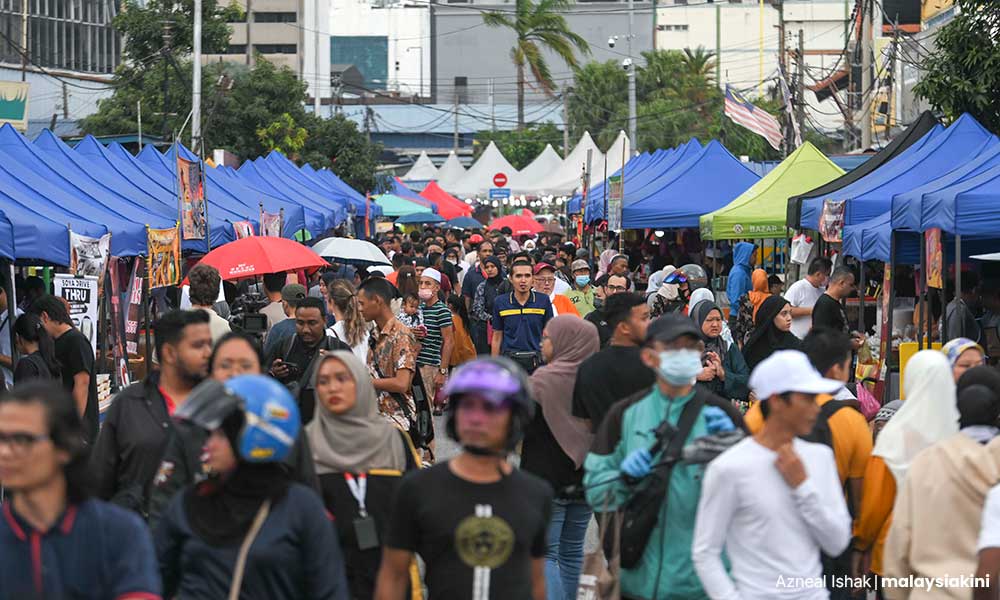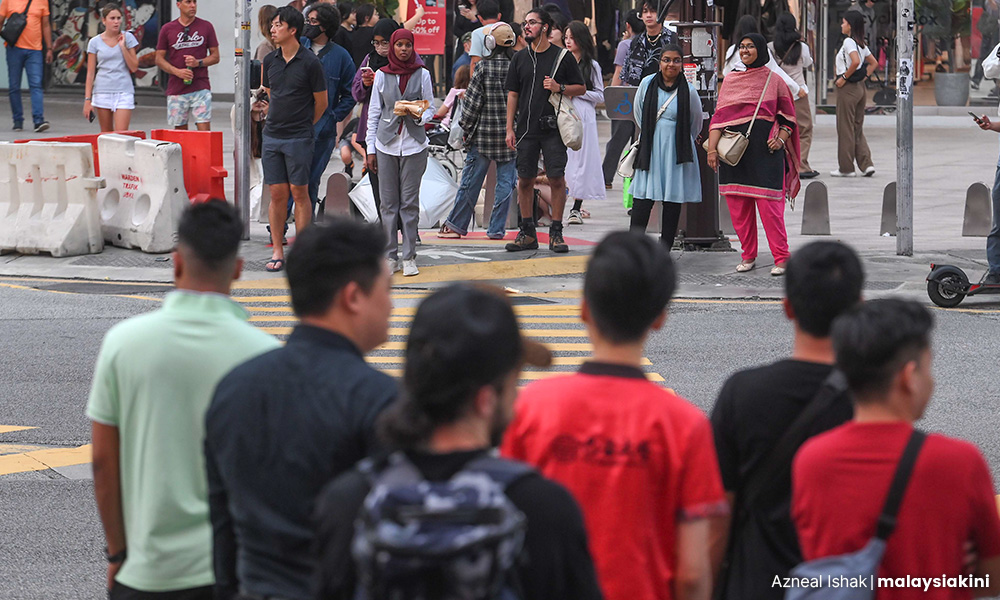“When we are hurting, we speak past each other and allow ourselves to be exploited by merchants of rage.”
We don’t talk about sensitive issues. At least not in a way that is even remotely productive. Some would say peace and stability are preserved because we skirted around those sensitive issues, rather than confronting them head-on.
This is because our society is too fragmented - ethnically, religiously, linguistically - to have productive disagreements and everyone is only going to be dragged into trench warfare: gaining not an inch of land but accumulating bodies of sacrifice.
I am beginning to see how this view is problematic. When we avoid sensitive issues, most of us will never learn to air our differences in a way that leads to insight, empathy and progress.
When we, the majority of Malaysians, do not talk about sensitive issues, we concede the space to the most vile, opportunistic, loudest individuals.
A theft incident (Lowyat), a road accident (Sam Ke Ting), a fireman’s death (Muhammad Adib Mohd Kassim), and a pair of socks (KK Mart). We do not need to get into the details of each incident to diagnose that we have a rage problem when our society’s first instinct in all these instances is to respond with rage.
Obviously, there are merchants of rage - those who profited from mobilising anger. But that does not explain why many people willingly fall into or resonate with their performative rage.
In moments of rage, no benefit of the doubt was given, no attempt was made to clarify whether an act was intentional, and there was no room for repentance.
Why all this rage? I think it’s because we don’t talk about our hurt.
Hurting our way into anger
I grew up in a family where we don’t talk about our hurt. We believed that we were doing each other a favour by enduring, rather than sharing, our pain.
After my sister and I became adults, we realised that it is not necessarily healthy. We lack the means - “cultural capital” as the French sociologist Pierre Bourdieu calls it - to articulate our hurt and this affects our intimate relationships.

This is applicable in familial, professional and societal settings. I talk to friends and colleagues from different races every day, but we don’t talk about race. We don’t talk about race because Malaysians have always been told in schools, on television, via newspapers, and just about every week that we must “jaga sensitiviti” (watch the sensitivities).
There is a difference between sensitive issues and difficult issues. When we say something is sensitive, we are saying dread with care, best to avoid it like a minefield. When we say something is difficult, we acknowledge the gravity of the situation, or the fine skills required to resolve it, but we don’t necessarily shy away from it - or indeed, have the option to do so.
When was the last time you had a meaningful conversation about race with someone of a different ethnicity? It’s not easy.
I remember feeling unease with friends who publicly scorned Nga Kor Ming for calling certain groups as “Taliban”, but the same people will not utter a word of disapproval when far-right groups like Ikatan Muslimin Malaysia - whose former president was recently charged with money laundering - make the nastiest insinuations and claims about half the population.
I was disappointed at their silence, and I’m sure there are times they have been disappointed by my silence too. I was unable to express this reluctance to speak about race until I encountered these words from Reni Eddo-Lodge, author of the book “Why I’m No Longer Talking to White People about Race”.
“So I can’t talk to white people about race any more because of the consequent denials, awkward cartwheels and mental acrobatics that they display when this is brought to their attention. Who really wants to be alerted to a structural system that benefits them at the expense of others?
“I can no longer have this conversation, because we’re often coming at it from completely different places. I can’t have a conversation with them about the details of a problem if they don’t even recognise that the problem exists… completely confused by this pain, at best trivialising it, at worst ridiculing it.
“Their intent is often not to listen or learn, but to exert their power, to prove me wrong, to emotionally drain me, and to rebalance the status quo. I’m not talking to white people about race unless I absolutely have to.”
However, when we don’t talk about our hurt, resentment builds up and hardens. People who have been in long-term relationships can testify that “sensitive” issues, when left unaddressed, lead to bottled-up feelings and couples tend to unexpectedly snap at the most random arguments.
Similar logic applies at the societal level.
Defending ourselves from merchants of rage
Every day, we don’t talk about sensitive issues and our hurt. But when there is a “triggering” incident, it is almost as if there is a suspension of decorum and all rules about not talking about sensitive issues are off.

Individuals scream (or type) their resentment on social media. Merchants of rage - from politicians seeking to make a name for themselves to nonprofit organisations seeking to raise funds - say the unsayable to capitalise on the occasion.
Saying there are opportunistic politicians pursuing their self-interest to ramp up the rage on “sock-gate” is like saying water is wet. So let us use another story to illustrate a point about instinctive rage.
This story started with a viral tweet showing a comment on a post about a Ramadan bazaar stall selling bread with chicken and beef. The comment read, “Handling all meats with the same gloves? A bit disrespectful to other people who don’t eat certain meats.”
This comment with a mere 11 likes, about an unknown shop, by an anonymous account, generated a firestorm on social media. A tug of war emerged with varying reactions:
“Bazar Ramadan tau bukan Bazar Depavali bukan Bazar Thaipusam” (It’s a Ramadan bazaar not a Deepavali bazaar not a Thaipusam bazaar)
“Terpaling triggered” (Easily triggered)
“Hypocrite! You don’t speak up when your people do it”
“Mcm biasa majoriti kaum kena ikut tekak minorities” (As usual the majority race must pander to the palate of the minorities)
“Grow up, cross contamination is a thing. Plus, some people have allergies that can’t be treated. It’s a legit question. Yall are just dumb enough not to process it”
“I wonder the same”
“Many non-Muslim people feel the same way about beef/meat in general as Muslims feel about pork. Their feelings deserve respect”
A contributing factor to why both incidents immediately descended into rage storms is we lack the ability, willingness, or experience to talk about “sensitive” issues in another way. We have learned to bottle our hurt, let resentment accumulate, and lash out at triggering incidents.
As a result, we developed two deficits. Firstly, we can’t or don’t know how to, express our hurt firmly and politely. We are unable to communicate sternly but not rudely, or have a civil dialogue with the relevant decision-makers rather than posting and amplifying our rage on social media.
In fits of rage, we don’t know when to stop, and how much reaction is too much until it’s too late. Psychologists call an extreme version of this intermittent explosive disorder.
Secondly, we can’t, or don’t know how to, respond when someone expresses their hurt. We become defensive. So defensive that we do not even hear what they say. Their hurt is invalid. We resort to “whataboutism” and list the bunch of things they have done that hurt us instead.

Rage is a dangerous thing, especially in plural societies like Malaysia. Multiethnic, multireligious communities who cannot communicate our hurt to each other are vulnerable to being exploited by merchants of rage.
So many have fallen prey, but they don’t see the merchants as predators - they see a version of themselves. As if The Predators are their anger translators.
We have neither the appetite to understand each other nor regulations on the dark industry of manufacturing rage. Since the latter is unlikely to happen soon, should we make an effort at the former?
Relationship expert John Gottman writes that negative emotions hold key social information to foster healthier and stronger relationships if we manage to make a breakthrough conversation rather than letting it fester into contempt for each other.
A crucial recommendation is to “express negative emotions in ways that allow each other to listen without feeling attacked so that the message gets through in a manner that encourages healing rather than more hurt.”
Journalist Ian Leslie wrote, “The risks of not airing our differences are too great… frustrations manifest themselves in low-level snipping (eroding trust) and we stop learning about each other (how they see us and how they see themselves) until it’s too late.”
When couples argue, it is never really about who should be doing the dishes, taking out the trash, or taking care of the kids. It is about worth, attention, appreciation, and effort.
When Malaysians argue, it is never really about the socks, the land or the stolen item. It is about the underlying hurt:
- From the majority perspective: what else do you want from us? You have it so good here, why are you still so demanding? Why do you reject our (my) language? Why are you so afraid of my religion? How dare you do this?
- From the minority perspective: why must you have everything your way? Have you ever regarded me as an equal? Why can’t you listen without being defensive? Are you aware of our lived realities? Why are you imposing your dos and don’ts on everyone else? How dare you say this?
These are the difficult issues to talk about. But if we don’t, rage will consume us all eventually. - Mkini
OOI KOK HIN is a political sociologist who dabbles in civil society. He was once castigated by his Bahasa Malaysia teacher for using “aku” instead of “saya” when speaking to her and has since learned the difference between the two.
The views expressed here are those of the author/contributor and do not necessarily represent the views of MMKtT.



No comments:
Post a Comment
Note: Only a member of this blog may post a comment.